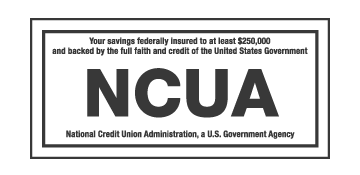The NCUA and Federal Deposit Insurance
At Kent Credit Union, our member’s deposits are federally insured up to $250,000 per individual depositor.
The National Credit Union Administration (NCUA) is the independent agency that administers the National Credit Union Share Insurance Fund (NCUSIF). Like the FDIC’s Deposit Insurance Fund, the NCUSIF is a federal insurance fund backed by the full faith and credit of the United States government.
The NCUSIF insures member savings in federally insured credit unions, which account for about 98 percent of all credit unions in the United States. Deposits at all federal credit unions and the vast majority of state-chartered credit unions are covered by NCUSIF protection.
As a member of a federally insured credit union, you do not pay directly for your share insurance protection. Your credit union places a deposit into the NCUSIF and pays an insurance assessment based on the total amount of insured shares and deposits in the credit union.
NCUA share insurance covers all types of deposits received at a federally insured credit union, including deposits in a share draft account, share savings account, or time deposit such as a share certificate. NCUA insurance covers members’ accounts at each federally insured credit union, dollar-for-dollar, including principal and any accrued interest through the date of the insured credit union’s closing, up to the insurance limit. This coverage also applies to nonmember deposits when permitted.
NCUA does not insure money invested in stocks, bonds, mutual funds, life insurance policies, annuities or municipal securities, even if these nondeposit investment or insurance products are sold at a federally insured credit union. Credit unions often provide these services to its members through third-parties. The nondeposit investment and insurance products offered by third parties are not insured by the National Credit Union Share Insurance Fund (NCUSIF). In locations where nondeposit investment and insurance products are recommended or sold to members, credit unions are required to disclose that the products:
- are not insured by NCUA;
- are not deposits or other obligations of the credit union and are not guaranteed by the credit union; and,
- are subject to investment risks, including possible loss of the principal invested.
In addition, NCUA does not insure safe deposit boxes or their contents. NCUA does not insure U.S. Treasury bills, bonds or notes, but these investments are backed by the full faith and credit of the United States government.
Share accounts in federally insured credit unions are insured up to $250,000. A depositor who has multiple deposits may qualify for more than $250,000 in share insurance coverage if the customer’s accounts are of different legal ownership and the requirements for each type of legal ownership are met.
For example, if you have a regular share account in your name alone and an Individual Retirement Account (IRA) at the same federally insured credit union, the regular share account is insured up to $250,000, and the IRA is separately insured up to $250,000. However, if you have a regular share account, a share certificate, and a share draft account in your name alone, those accounts would be added together and insured up to $250,000.
A member’s interests in all joint accounts in the same federally insured credit union will be added together and insured up to $250,000. Roth IRAs will be added together with traditional IRAs and insured up to $250,000 per depositor, per federally insured credit union.
Additional coverage is also available on revocable trust accounts, often referred to as payable on death accounts or living trust accounts. The funds in revocable trusts are insured for each owner up to $250,000 for each beneficiary. The beneficiary must be a natural person, charitable organization, or non-profit entity under the Internal Revenue Code. This coverage is separate from and in addition to the coverage available for accounts within other ownership categories.
Coverdell Education Savings Accounts, formerly education IRAs, are insured as irrevocable trust accounts.
Source: NCUA.gov






 © Kent Credit Union
© Kent Credit Union